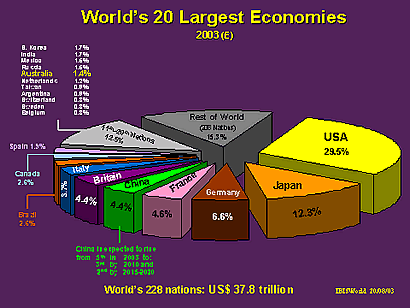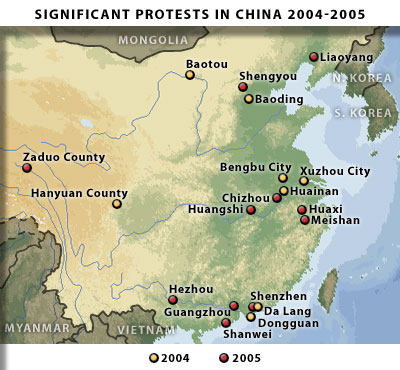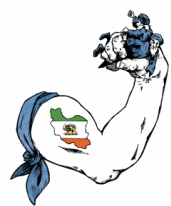Everywhere one looks these days, one sees articles in Business Journals and the Mainstream Media, buoyantly trumpeting messages such as,
Continued economic growth will make this the Chinese Century
Phil Ruthven - posted Monday, 17 November 2003
China was the world?s largest economy (in purchasing power parity terms) for most of the last millennium, excluding the 19th and 20th Centuries, when it had largely ignored the industrial revolution.
Today it is the second-largest nation after the USA in economic size (PPP GDP) ? although still just over half the size of the USA ? and will be fifth largest in $US terms by the end of 2003, having climbed several rungs on the ladder over the past two decades.

China will have overtaken Britain by the end of 2003 calendar year, and France by the end of 2004 or early 2005. Sometime on or around 2010, it will overtake Germany; and between 2015-2020 it is expected to overtake Japan to become the world?s second largest economy in both US$ terms and PPP terms.
Will China then set its sights on the USA? Yes, but it is unlikely to overtake the USA easily or quickly. By the same token, a fast rising number two often gets more attention than number one, as we saw with Japan in the 1980s before Japan?s economy slowed to a halt in the 1990s and early years of this new Century.
If China is to overtake the USA, it is expected to be in the second half of the 21st Century; and that feat, if achieved, would make this the Chinese century.
China has the numbers, of people that is. With 1.3 billion citizens (20.5 per cent of the world)
A market of that size does have a logic all of it's own. Of course the People's Daily is even more optimistic.
Wu on China's Economic Prospects in 21st Century
The reason why China has been able to maintain a good momentum of economic growth in an adverse economic environment is that it has, under the leadership of President Jiang Zemin, adopted timely measures to respond to the circumstances and gone ahead with reform and opening-up," he stressed.
China's Economy to Fly Colors in 21st Century
China is entering an upturn stage of its economic growth, and it will be one of the few economies that will experience faster growth in the 21st century, said a group of economists from the world's leading banking and investment institutions in Hong Kong.
The most important factor that keeps China's economy continuing to maintain an accelerating, sustainable growth is the country's impending accession into the World Trade Organization (WTO), said Yiping Huang, Salomon Smith Barney (SSB) vice-president for Asia Pacific economic and market analysis.
The move will not only bring in more foreign investments, but also create a more favorable environment for its development to promote thoroughgoing reform and wider opening up, Huang noted. "What is more important is that the entry into the WTO will result in a range of economic rules that conforms to the international conventions," he added.
But there are other visions, visions that give other reasons for the continual accelerated growth.
From Stratfor.com we hear of a seething volcano about to erupt.
Last week, a group of Chinese villagers staged a demonstration against a wind-power project near Shanwei, a town in Guangdong province about 100 miles from Hong Kong. In the first incident, protesters blocked access to the site of the wind-power generation project. The next day, Dec. 6, demonstrators returned. According to Chinese official reports, they were led by three men -- Huang Xijun, Lin Hanru and Huang Xirang -- and were armed with knives, steel spears, sticks, dynamite and Molotov cocktails. Members of the local People's Armed Police fired tear gas at the crowd, hoping to break things up, but the three leaders rallied the crowd to continue what, depending on who was telling the story, was either a protest or attack. According to the description of events given by the Chinese government, the demonstrators started to throw explosives at the police as night fell. The police opened fire. Official reports said that three people were killed, eight wounded"
"The shooting is new. The pattern is not. There has been intensifying unrest in China over the past year -- frequently, as in this case, over issues that have been simmering for years. This has been particularly true for peasants who have seen their land confiscated by the government for industrial projects. Money is issued to local officials by state-owned enterprises and other investment groups to cover the cost of the land. That money passes through the regional and local bureaucracies. By the time it should reach the owners, there often is nothing left; it has been stolen by officials at various levels. No one denies the farmers' claims to the land, but no one acts to compensate them. The laborers go from being small farmers to being destitute.
This is a critical process at the heart of Chinese industrialization. The purchase of land, including forced sale, is considered necessary for Chinese economic development. However, Chinese economic development is driven as much by corruption as by land. The government in Beijing has no particular desire to see the farmers dispossessed; on the contrary, the money is made available for delivery to the farmers. But the diversion of funds is hard-wired into the process. It is one of the primary means for capital formation in China. "
"The old economy was land-based: Mao created a peasant economy that was overlaid by attempts to industrialize. The new economy regards land as an input into the industrial machine. However, given the nature of the Chinese political system, the farmers are not simply bought out -- they are forced off the land. And that can lead to social explosions."

The specifics of what happened, of course, have no geopolitical consequence. What is important is that tensions in China have been rising steadily. Thousands of
(74,000, according to figures released last year by the government) have taken place)
-- some reportedly violent, if not fatal. In one case earlier this year, residents protesting corruption related to land seizures took control of their town, forcing the police out. The Chinese government appeared to capitulate to the demonstrators, giving into their demands -- but weeks later, those who had participated in the rising were quietly arrested. In another incident, which also turned deadly, brute squads believed to have been hired by local officials and businesses attacked protesters. There are numerous other examples to draw from.
"Beneath the surface, a number of things are taking place. The Chinese economy has been growing at a frantic pace. This is not necessarily because the economy is so healthy, nor because many of these industrial projects make economic sense. In fact, the government in Beijing has been very clear that the new projects frequently don't make a great deal of economic sense, and has been trying to curb them (though it does not necessarily command obedience in every case from provincial or local governments). On the other hand, China needs to run very hard to stay in place."
"China is a mass of dispossessed farmers, urban workers forced into unemployment by the failure of state-owned enterprises, and party officials who are urgently working to cash in on their position. It is a country where the banking system has been saved from collapse by spinning off bad debts -- at least $600 billion worth, or nearly half the GDP of China -- into holding companies. This maneuver cleaned up the banks' books and allowed Western banks to purchase shares in them, shoring them up. But it also left a huge amount of debt that is owed internally to people who will never see the funds."
"The important thing to note is that both the quantity and intensity of these confrontations is increasing. While the Western media focus on the outer shell of China's economic growth -- the side that is visible in Western hotels throughout major cities -- the Chinese masses are experiencing simultaneously both the costs of industrialization and the costs of economic failure. The sum of this equation is unrest. The question is how far the unrest will go"
For brevity I have cropped part of an email from stratfor.com.
I will put the full report on a separate page for those who wish to read it's entirety.
This report may be distributed or republished with attribution to Strategic Forecasting, Inc. at www.stratfor.com.
Lest anyone feel my viewpoint is too pessimistic, I wish to point out there is an area of the Chinese economy that is growing, without the dislocations mentioned above, an industry that may make up between 6 to 12% of China's GDP.
It happens to be the Oldest Profession
Which Brings us now, full circle to the Title that started all this.
The Lusty Chinese Economy
A Close Look at China's "Sex Industry
[related link: Red Light District a book on prostitution in China]
by Zhong Wei (Lianhe Zaobao -- Singapore October 2, 2000)
"Prostitutes are people living on the edge, struggling for existence. If we estimate that 20 million prostitutes earn 25,000 RMB annually, that comes to 500 billion RMB or is 6 percent of the PRC GDP. More over, China's "new left" economist Yang Fan estimates that half of the prostitutes income goes to consumption, so that represents consumption of 250 Billion RMB. Prostitutes need quite a lot of equipment: beepers, cell phones, cabs, apartments or rooms in homes, expensive clothes and fine cosmetics and even bodyguards, pharmaceuticals.. so the sex industry may well move the economy along with an annual level of consumption of 1 trillion RMB.
The "sex industry" is certainly a significant part of the Chinese economy. When we consider that the Chinese GDP in 1998 and 1999 was 7.8 trillion RMB and 8.3 trillion RMB, the contribution of the "sex industry" to the GDP comes in at about 12.1 - 12.8 percent. Thus it is not moonshine to talk about the economic importance of the "sex industry". The economist Yang Fan even estimates that with the implementation of the "Regulations on the Management of Places of Entertainment" issued by the State Council during the latter half of 1999,
the Chinese GDP dropped by one percent. "
The sanbeinuu [prostitutes in dance halls, bars etc.] break down into three types:
-- From the countryside, very young with little education. They have no skills and have a hard time getting a decent job in the city so it is very easy for them to fall into that line of work. The cruelest fact is that after selling all of their self-respect they often kill them selves in their little hole in the underground spaces of the city.
-- The second type is the urban girl with a modicum of education who falls into this life because she want fancy things
-- The third type is the highly educated, pretty urban girl who goes into it voluntarily to have a golden nest.
As more and more rural people leave the limited lands in the countryside to move into the city, likewise are more and more industrial workers finding themselves jobless as the result of advancing technology. There must be over a hundred million unemployed women. Where can they go?"
There will be much opportunity and much risk it seems during the Chinese Century
A prudent investor might look south west of China to the Largest Democracy in the world with a market that rivals China, India.
I wonder why we don't read articles about the
Indian Century??
Linked to
Diane's Stuff at Wednesday Weekly Open Trackback Alliance Fest
third world county at Batting cleanup... and Open Post
Stuck On Stupid at Crooked Democrats in ByrdLand & Open Trackbacks & Link Fest
Rempelia Prime at Wednesday Open Trackbacks
NIF at Zing!
MacStansbury.org at If it's Wednesday, it must mean Open Trackbacks, cause you can't have Wednesday without Open Trackbacks, now can ya? Can ya?
Right Wing Nation at Wednesday Open Trackbacks
Colbert Report at Mr. Ambassador, Perhaps a Review of our Laws are in Order
| Post Comment | Permalink | Share This Post
Updated: Thursday, 15 December 2005 9:54 AM CST

















